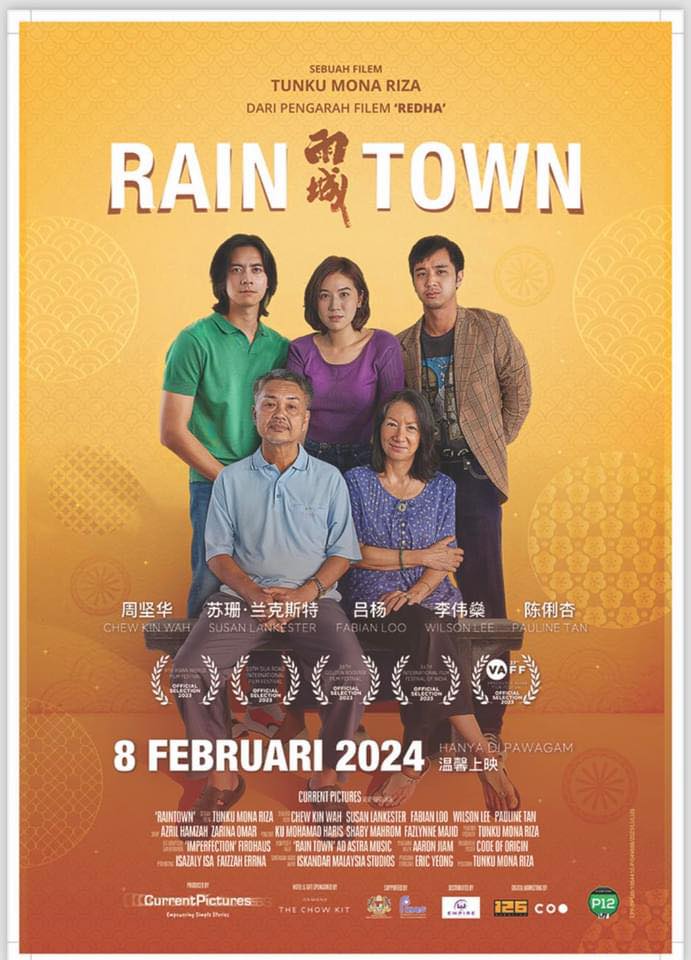Rain Town is everything that you expect from what could be a slow-burning drama, as it takes regular family tension to another height thanks to powerful performances by the leads in this satisfying, taut storytelling by Tunku Mona Riza.
It was not until nearing the climax that there was something of a revisionism going on in the film, directed by Tunku Mona. From the outset, Rain Town is a typical family drama set in the “rain town” itself, Taiping, known for recording the highest amount of rainfall per year. As the story progresses the revelation of characters, the evolution in fact, sets the film apart from its fellow melodramatic counterparts.
The plot revolves around a headstrong, lantern-making patriarch, Choo (Kin Wah Chew), who rules over the family with an iron fist and is himself not without weakness—gambling. There’s the mother Aileen (played by Susan Lankester, yes, that Susan Lankester), caring, sharing, and being the to-go person for the kids when daddy has only “no!” in his vocabulary wallet. (Susan, though speaks Cantonese, doesn’t play a Malaysian Chinese, before some of you start carrying placards, her character, like Susan herself, is a Rojak, i.e., British dad and Chinese mom). Then, there are three children: Isaac (Fabian Loo), Alex (Wilson Lee), and Ruby (Pauline Tan) – all about the same as the other three fingers in a hand.
The plot is not new. The characters are shades of many we have watched on screens before. What makes it even better is that they are Malaysians – people we know. The dialogues constitute a heavy mix of Cantonese, English, and Malay, which will get the non-Chinese or non-Cantonese speakers around and provide the crucial emotional GPS during any part of the flick. Still couldn’t understand what they were saying? There are three subtitles: Malay, English, and Mandarin. If you are still lost, check which movie hall you are in.`
The Rain Town Journey That Matters
As mentioned, the plot is not new. You can find it in any Drama Minggu Ini type of shows or old Tamil films (Sathuranggam, 1978, comes to mind). But it’s the journey that matters. Many times, it belies the expectations of those who have seen the abovementioned dramas, or, for fans of Indian language shows, the mega serials—this is where the revisionist aspect takes place. There may seem to be stereotypes in that family, but when the director takes us deeper into their world, they are a whole bunch of very original characters whom we are rediscovering—as often we do in real life, where we think we know some people, only to know that there are much more to know about them.
This is why the emotional roller-coaster ride provided by the characters works, thanks to the riveting performances by all of the leads, especially Susan Lankaster.
And good god, Susan girl! How far she has come from playing an Ang Moh stereotype in TV and film comedies, often at her own expense (the Rojak parentage), and boom! Suddenly, she’s pulling off a Meryl Streep right in front of our eyes. She is the central station, the never-centre, nay, the gravity of the film. She’s still that Ang Moh-ish girl belting out strategic, accented English dialogues, but this time it’s not for laughs. Again, this is a revisionist look at the stereotyping our film and TV landscape have unleashed on us for decades.
I have not seen Lankester even on a small screen for a long time—decades, in fact. Sure, she is a lot older now, and she has aged into giving us one of the most powerful performances I have ever seen in this industry. If she does not win any awards for this flick, I will eat my shoe. (Please win, Susan, my teeth are not strong.)
Emotionally Taxing
Add to her character’s and the others’ predicaments, one can be assured that Rain Town can be taxing emotionally, as it does pull you into the monsoon. Which is why I would be lying if I said that there were no dull moments. There was quite a bit. If you are emphatically empty, it’s going to be a hell of a boring flock. But thanks to the emotionally naked onscreen performers, we live with them and tough it out, scene after scene.
Since most of the action takes place indoors, Taiping, unfortunately did not become the star of the film, as did Woody Allen did with New York (who incidentally made A Rainy Day in New York a few years ago) as the filmmaker would have intended to. It’s the people of Taiping, like the side characters who gamble with senior Choo, who provide the face of the locale.

Also, don’t be too taken away from the storyline given in IMDB (by the filmmakers) that promises tearjerking scenes frame after frame. There is quirkiness and even sly humour in some parts. It has two strong female characters (mom and daughter) who do not wield weapons or issue flying kicks. And beware; it may not fulfill your expectations if you anticipate a neatly wrapped-up package at the end. It looks like a happy ending, it sounds like a happy ending, and it even feels like a happy ending.
Forget any of that; the film doesn’t end. And that’s what would trouble the audience, walking out of the darkness into light after the end credits, and still in dark. They would brood over the question, “What’s gonna happen to them?”. – NMH
Other articles by the writer:

A movie buff, as opposed to film connoisseur or aficionado, because the last two words are hard to spell, Rakesh has been in the field of writing for more than two decades and hopes that one-day movie “buff”ing is lucrative enough to afford him a Batmobile, the Michael Keaton one.
Facebook Comments